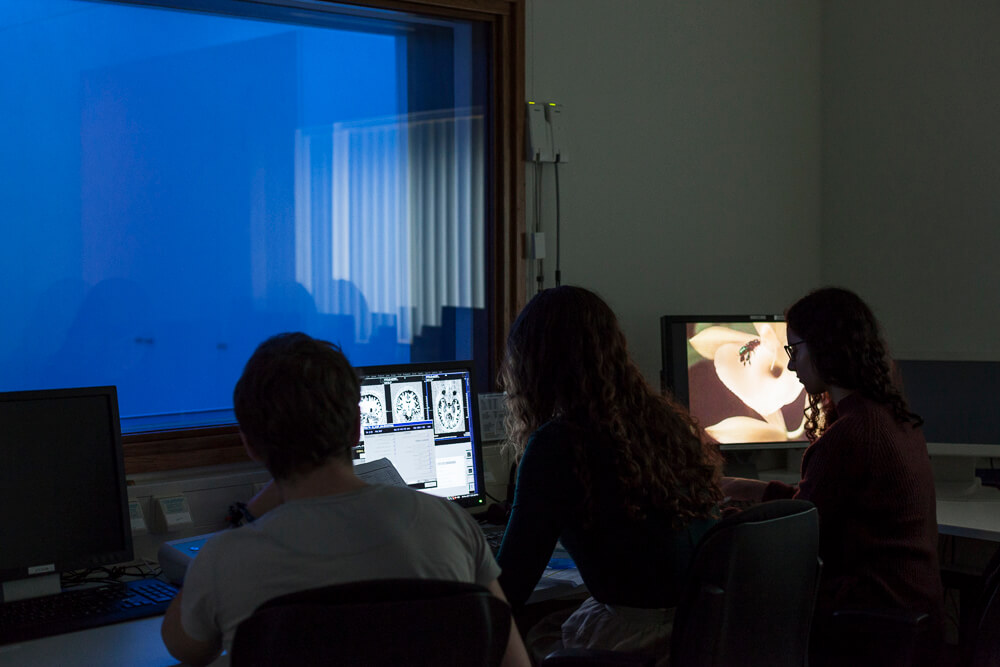Beckley / Maastricht Psychedelic Programme
About the Beckley/Maastricht Research Programme
Amanda Feilding and Jan Ramaekers, Professor Psychopharmacology at Maastricht University, developed a collaborative research programme in 2017 to investigate in great detail the increasingly popular practice of microdosing, and its potential therapeutic applications. Our first LSD microdosing study aimed at identifying the optimal dose of LSD to improve mood, cognition and pain resilience, with minimal side effects and interferences to day to day life.
Following up on this work, the Beckley/Maastricht Research Programme is now conducting a new study to investigate in greater details the effects of repeated small doses of LSD using neuroimaging tools that will allow looking at changes in brain function.
More information about these two studies can be found here.

Other Beckley / Maastricht research projects
Investigating in more depth the effects of psilocybin on brain function
This study used multimodal MRI (MRI spectroscopy and fMRI) in order to further elucidate the mechanisms of action of psilocybin in the brain, with a particular focus of the neurobiological mechanisms underlying the experience of ego-dissolution and its link to glutamate concentrations in the brain.
Glutamate is the major excitatory neurotransmitter in the mammalian central nervous system. It is the primary system regulating neuroplasticity in the brain. Several studies have demonstrated that activation of 5-HT2A receptors by classical hallucinogens or by serotonin leads to a robust, glutamate-dependent increase in the activity of pyramidal neurons, preferentially those in layer V of the prefrontal cortex (PFC). However, the link to the subjective effect(s) associated with the release of this neurotransmitter in the prefrontal cortex have never been studied.
Furthermore, the effect of 5HT2a agonists on glutamate level in the hippocampus, a region that is critical for learning and memory, is less clear, and has never been investigated in humans.
The study was completed in 2019, and the first article was published in the prestigious Nature Neuropsychopharmacology in 2020: Me, Myself, Bye: Regional Alterations in glutamate and the experience of ego dissolution with psilocybin. This paper shows for the first time, the effect of psychedelics on the glutamate system, potentially mediated through the 5HT2A receptor. With a correlation between changes in glutamate concentrations and different dimensions of the ‘ego dissolution’, this study contributes data to understanding the neural correlates of the experience of ‘self’.
Beyond elaborating on the neural correlates of the ‘self’, this study explores the association between a number of psychopathologies and hyper-hippocampal glutamatergic activity, and sheds light onto the underlying neurochemistry of psilocybin’s therapeutic effects.
About Maastricht University

Maastricht University (UM) is the most international university in the Netherlands. Thanks to its high-quality research and study programmes as well as a strong focus on social engagement, UM has quickly built up a solid reputation. Today it is considered one of the best young universities in the world.
Podcast
- All
Links
- All
Support
- All
BIPRP
- All
Science Talk
- All
Amanda's Talks
- All
- Video Talk
- Featured
- 2016 Onwards
- 2011-2015
- 2010 and Earlier
- Science Talk
- Policy Talk
One-pager
- All
Music
- All
Amanda Feilding
- All
Events
- All
Highlights
- All
Psilocybin for Depression
- All
Current
- All
Category
- All
- Science
- Policy
- Culture
Substance/Method
- All
- Opiates
- Novel Psychoactive Substances
- Meditation
- Trepanation
- LSD
- Psilocybin
- Cannabis/cannabinoids
- Ayahuasca/DMT
- Coca/Cocaine
- MDMA
Collaboration
- All
- Beckley/Brazil Research Programme
- Beckley/Maastricht Research Programme
- Exeter University
- ICEERS
- Beckley/Sant Pau Research Programme
- University College London
- New York University
- Cardiff University
- Madrid Computense University
- Ethnobotanicals Research Programme
- Freiburg University
- Medical Office for Psychiatry and Psychotherapy, Solothurn
- Beckley/Sechenov Institute Research programme
- Hannover Medical School
- Beckley/Imperial Research Programme
- King's College London
- Johns Hopkins University
Clinical Application
- All
- Depression
- Addictions
- Anxiety
- Psychosis
- PTSD
- Cancer
- Cluster Headaches
Policy Focus
- All
- Policy Reports
- Advisory Work
- Seminar Series
- Advocacy/Campaigns
Type of publication
- All
- Original research
- Report
- Review
- Opinion/Correspondence
- Book
- Book chapter
- Conference abstract
- Petition/campaign
Search type
